Silk and Ochre: intercultural food journeys in Asia and Australia
Wednesday 7 October 2009
6.00pm start
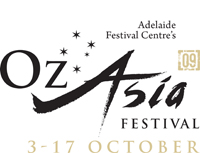
Presented by The Bob Hawke Prime Ministerial Centre and the Adelaide Festival Centre's OzAsia Festival
Join national media personality and co-author of Banquet, Annette Shun Wah, international global foodwatcher, Takashi Morieda, and stand out Australian chefs, Cheong Liew and Tim Pak Poy in a 'crossroads' conversation about Australian and Asian cuisine, and their personal intercultural food journeys.
Explore the business of thinking and writing about food with a cross cultural Asian perspective.
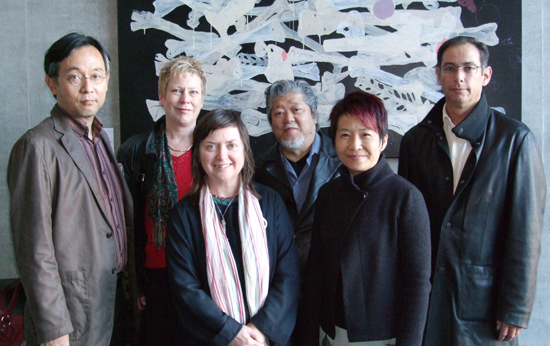 |
| Takashi Morieda, Elspeth Probyn, Elizabeth Ho, Cheong Liew, Annette Shun Wah, Tim Pak Poy |
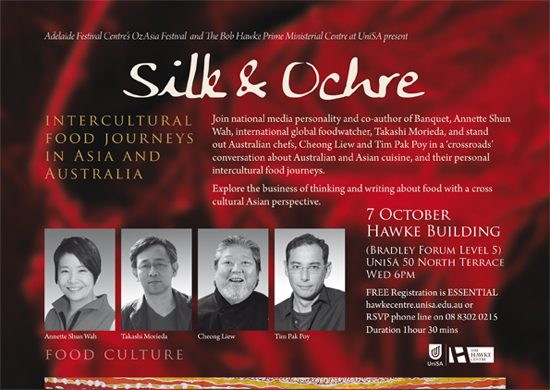
To book for other OzAsia Festival events, please go to the Festival website: www.ozasiafestival.com.au.
Biographies
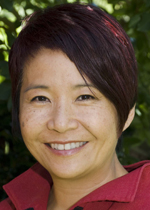
Annette Shun Wah is a freelance broadcaster, actor and writer. Her career began in radio, including stints at 2WS (Sydney), Triple J and more recently ABC Local Radio. She programs and presents world music for Qantas Inflight radio.
Annette is familiar face on television, presenting and producing many programs for the ABC and SBS including The Noise, Eat Carpet, Imagine, Studio 22, Media Dimensions and The Movie Show.
As an actor she was nominated for an AFI Award for her performance in Australia's first foreign language feature film, Floating Life, directed by Clara Law. She has also appeared in guest roles on television series such as Always Greener and the Young Lions, the feature film The Home Song Stories and several short films.
A former contributor to the Sydney Morning Herald, Annette's writing has been published in various anthologies, including Grandma Magic edited by Janet Hutchinson; Growing Up Asian in Australia, edited by Alice Pung; Family Journeys published by the National Archives of Australia; Come Away With Me edited by Sarah MacDonald; and the journals Meanjin and Life Writing. Her book, Banquet - Ten Courses to Harmony, co-written with Greg Aitkin is part-social history, part-food culture, and won a Bronze Award at the 1999 World Food Media Awards.
Annette serves on the board of the Sydney Writers' Festival; the Performing Arts and Arts Management Committees of Asialink; and is President of the Asian-Australian performance and advocacy group, Performance 4A.
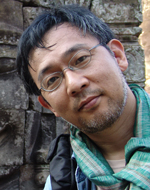
Takashi Morieda gained his degree at the International Christian University in Tokyo, majoring in Cultural Anthropology. Following graduation he went to Thailand to cover the war in Cambodia as an assistant of the ABC (American Broadcasting Company) and Asahi Shimbun. He later became a photo journalist covering food, dietary culture, including wine culture, visiting many places all around the world.
Takashi writes columns in Nikkei (the Japan Economic Journal), Asahi Shimbun and many other magazines. He also lectures about food and dietary culture in a number of universities, including Sapporo University.
He has written more than 40 books about food culture and was the culinary photographer for the book Tetsuya - written in 2000 by Australia's most celebrated avante garde Japanese chef of the same name.
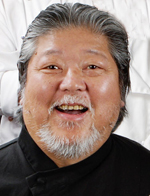
Cheong Liew, Chef to The Grange at Hilton Adelaide, was acknowledged in the Queens Birthday List on Monday 14 June 1999. He was awarded an OAM - Medal of the Order of Australia - in recognition for "service to the food and restaurant industry through involvement in developing and influencing the style of contemporary Australian cuisine".
This honour recognises a talent long known in Australia - Cheong Liew, the Malaysian-born Chinese whose fusion of Asian culture, Australian ingredients and classical French technique has made his name synonymous with cookery at the crossroads. His art is a seamless blend of east and west that French-based American judge Patricia Wells found irresistible when naming the Grange Restaurant Australia's best in the 1998 Remy Martin/Australian Gourmet Traveller Award. "My cuisine is about understanding and appreciating cuisines of different countries and then cooking it from the heart" Cheong explains.
Cheong Liew, recognised as "an original genius" by no less a critic than the former Premier of South Australia, the late Don Dunstan, returned to front-line cooking only in 1995 after several years at the Regency Hotel School. Inspiration...Innovator...founder of the Australian cuisine...master chef...guru...are many of the superlatives used to describe Cheong.
Recreating the amazing blend of boundless imagination with flawless perfection which first saw Cheong gain national recognition. Regarded as one of Adelaide's treasures, Cheong has been recently honoured by the prestigious United States magazine Food & Wine as one of the 10 "hottest chefs alive".
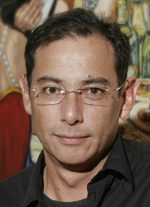
Tim Pak Poy is a Sydney based specialist consulting to the food industry with focus on creating memorable dining.
A trained chef and restaurateur Pak Poy has been awarded the major Australian culinary accolades for his progressive presentations blending food, wine, service and ambience.
The Sydney Morning Herald 1996 Good Food Guide awarded Pak Poy their highest culinary accolade and the inaugural Restaurant of the Year Award citing an unprecedented score of 19/20 for his work at the iconic 'Claude's Restaurant' in Sydney.
In 2000 Cheong Liew and Tim Pak Poy represented Australia at the internationally acclaimed Slow Food event 'Salerno del Gusto' held in Turin, Italy. Their session, exploring the unique expression of Australian cuisine, was sold out months in advance.
In 2004 Pak Poy he was named the Restaurateur of the Year by the Restaurant & Catering Association NSW.
Pak Poy's business roles have included Creative Directorships, Company and Managing Directorships, Restaurant Chef and Proprietor, Food and Wine Consultancies and Panel Judging within Australia, Japan and Malaysia.
Tim Pak Poy's latest signature restaurant, The Wharf Restaurant, focuses on casual Sydney dining in a unique heritage timber finger wharf housing the Sydney Theatre Company on Sydney Harbour. Pak Poy has for a number of years been assisting in the development of the black truffle industry in Australia.
While the views presented by speakers within the Hawke Centre public program are their own and are not necessarily those of either the University of South Australia or The Hawke Centre, they are presented in the interest of open debate and discussion in the community and reflect our themes of: strengthening our democracy - valuing our cultural diversity - and building our future.



